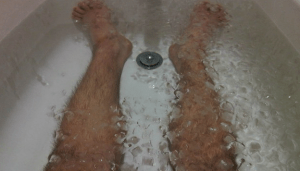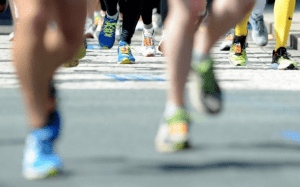By Lauren Dobson
It has crept up on us extremely quickly but marathon season has arrived.
Most of the marathon athletes are panicking because they’ve not done enough training, are not feeling very confident and are cramming in the last few long runs in before the rest needed on the run up to the big day.
But the time after the race is just as important as the build-up and I thought I would take you through a few tips of how to recover well and get yourself back to feeling good.
Firstly you need congratulating on completing your event, not only is it the 26.2 miles on the day, but it’s the hard run up an preparation phase that has probably been the hardest bit.
Now another crucial part of the whole marathon experience is the recovery. If you get that right, the whole race will have been a complete experience for you as an athlete.
You have earned the right for some serious down time and the ability for you to recover will determine the real long-term outcome.
It is extremely important that after a marathon you rest and recover properly. Once you have crossed the finish line and you’ve received your medal and celebrated, the next stages are crucial.
Initially, there are a few simple steps to follow. Firstly, quickly change your clothes and footwear. Your clothes will be wet from either rain or the sweat and fluid released from your body and your feet will be swollen.
Your body will immediately go from feeling like it is in the Bahamas to feeling like you are at the top of a big hill in Scotland, maybe even the Antarctic.
You will be cold and clammy so get a blanket on you to prevent your temperature dropping rapidly. Change your clothes as soon as possible and put on some loose footwear and let your feet breathe.
Secondly, you need to put your feet up because your body needs blood flow. Make sure you are stable enough to be on your own and lie on your back (ideally somewhere dry) and put your feet up for 10 to 15 minutes. Repeat that several times during the day.
While you are resting, you quickly need to take on calories/recovery food. Your body has just lost an awful lot of fluid, nutrients, minerals, anti-oxidants and enzymes and these need replacing to help your blood sugars return to a normal rate.
One important thing to note, however, is that during a marathon, blood flow is pushed away from your stomach to working muscles, so it is important to give your digestive system some time to return to its normal working condition before you sit down and have a large meal.
Grabbing a bag of chips or fast food before going home to sit on the sofa can slow your recovery for days. Replace your body with a small amount of easily-digested carbs and protein either in the form of a solid or a liquid, little and often. Take snacks to the race with you and, if you can, arrange for someone to meet you at the finish line as you probably won’t be the only athlete that wants food in a hurry.
Once your stomach feels ready and has had time to recover, eat well.
Next you need to look after your body. Realise whether you need to seek help or whether you can self-manage the strains that your body has just gone through.
Look after your injuries, treat your blisters, ice any inflammation, deal with any pain and get a light massage in the next 48 hours if you can – but make sure the therapist knows what you have just participated in and ask them to be gentle.
If that’s not possible, self massage will be effective but, once again, being gentle will be the key as the aim is to help your body relax, flush out the toxins and aid blood flow to enhance your recovery.
When you are back home or back at the hotel, your aim should be to relax, replenish, rehydrate and have a shower or bath. A cold or hot bath will be brilliant to promote recovery.
A good night’s sleep will be hard on the first night as you’ll be shattered but sore. Keep plenty of fluids beside your bed and keep your feet elevated.
The following day is normally when the fatigue and soreness will kick in. We are still in recovery and while frequent rest is needed, total rest is your enemy. The tissue needs to repair and it’s important to stay active. By this we mean a pool session for an easy swim, a short spin on the bike, a casual walk or a very light jog.
No matter how good you feel, limit yourself to 3 to 4 miles maximum, providing you didn’t pick up and bad blisters or muscle strains, an altered gait on walking and running will create a number of issues you won’t like.
It is important you can differentiate between acute injury and muscle soreness and if in doubt, seek professional medical attention. Light activity will improve circulation and help flush out metabolic waste and aid oxygen and nutrients flowing to your muscles again.
Initially it would be wise to avoid heavy stretching techniques especially if not warmed up, your muscles will be tight and delicate and over-stretching will lead to micro tears. Light stretching will be effective after your light activity focusing on stretching your; Achilles tendon, calf complex, hamstrings, hip flexors and gluets.
Maintaining mobility, replenishing with good nutritious food, rehydrating, looking after your body and resting is the key to your recovery.
So when can you return to running?
The recovery phase is always underestimated and rushed with your drive to get back running and reach your next goal. But sticking to your recovery is crucial. Mobility exercises, stretches, self-massage tools or sports massage will help overcome the tightness and stiffness before you start running again once the body is ready for it.
When you return to full training protocols is purely down to your body, your level of activity, the stage of injury, your history and your personal needs. Two main things to consider is to mix your activities. Involve a combination of sports to avoid the pounding impact on the ground and when starting to run again, start off on a flat incline, softer surface and begin at a low intensity and progress slowly.
Interval training, swimming, cycling, deep-water running, stretching and flexibility exercises will all help mix it up and get you back on track for your next goal.
Finally, for the following two weeks after a marathon, sleep and nutrition can be vital to avoid picking up any injuries and recovering correctly.
Good luck.
LIKT THIS? Then try ‘How To Prepare For A Marathon’ by Tom Heeley








